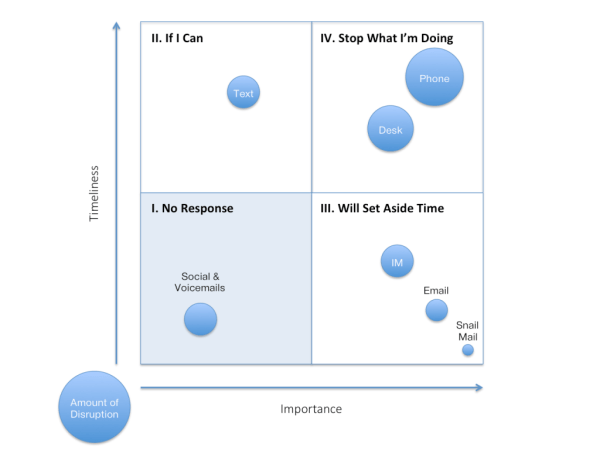(re-reading this post I realized it’s worth adding that this is primarily for ‘work-ish’ conversations)
This past Sunday as I landed at Hartsfield and flipped my phone off of airplane mode I received a text reminding me something very important that I needed to do when I got to the office on Monday.
Seems normal, right?
The thing is, like anyone else I’m human and forget things, which left me with two options:
- Hope I remember by the time I deboard, get to my car and drive home – about an hour long process, or
- Create a reminder of my own in email/Trello/etc
Neither are terrible inconveniences, but a slight pain nonetheless and if I’m not proactive enough about it run the risk of missing the task altogether, which would be the worst outcome.
Your Means of Communication Matters
I thought I’d give my take on what’s the best way to reach me depending on the situation.
Typically it depends on two factors: Importance and Timeliness. The other important consideration is the Disruptiveness to the other person. Admittedly I’m more critical of this than most, but I feel strongly that people’s time is their most valuable asset, so should be treated as such.
Phone
If it’s urgent, make the phone call. Maybe you’re walking into a sales meeting in 10 minutes but need to check with your boss to confirm the proposal quote.
However, what I don’t include here is stuff that falls into the “this would be easier to talk through” category. If that’s the case, fine, but before calling first check to see when it’s a good time to do so.
Remember that phone calls are very disruptive, as the other person has to immediately stop whatever they’re working on. What’s worse, this creates “Task Switching” costs, one of the biggest time-sucks for software developers. So only call if you really must.
Desk Conversation
To me the desk conversation is just as disruptive as the phone conversation, but has the slight benefit that you can gauge whether the other person is free or not.
Desk convos are a great use of the “this would be easier to talk through” conversations.
Text
With texts we take a considerable drop in the disruption level. Texts work best for immediate and near term actions, or just general FYIs.
But since I’ve rarely seen someone use texting as a task management system, pick something else if it’s something to do later.
IM
Instant messages a great for important conversations that aren’t urgent. Often strung out over the course of an hour or so, it suits itself very well for multitasking.
IMs also naturally transition to phone calls or desk conversations very easily when text no longer is enough AND when both sides are free.
The lease disruptive is of course email. Similarly, it’s also the least timely. Yet email is where 80%of your conversations should happen.
Now, you’ll probably be thinking that this only encourages more emails in your already overflowing inbox. However, is that a problem of choosing the right means of communication? Or is the problem of excessive communication?
Other?
And for good measure there are some other non-major communications to consider:
- Snail Mail – Usually left off lists like these, but remember that people love to get personal letters. You’re competing against bills and mounds of junk mail. This is a win-win for you.
- Social – Twitter, LinkedIn, Instagram, Facebook, Snapchat…this is a post of it’s own. For now let’s acknowledge the difference exists.
- Voicemail – Please don’t leave me a voicemail. Just don’t. I probably won’t ever listen to it.
What other methods of communication did I forget? Where do you disagree with me?
